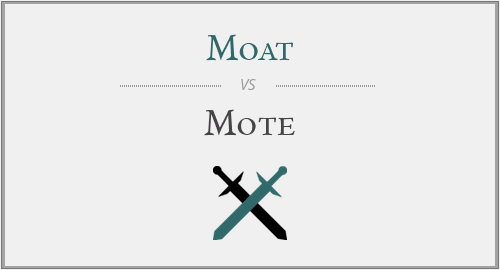There are millions of tiny dust motes in the air.
He fell in the moat around the castle.
Consider the two sentences above and try to figure out what moat and mote mean from their respective sentences. Can you do that? If so, good for you, but if you have no idea what either one or both of the homophones (words with similar pronunciation but different meanings and spellings) mean or represent, keep reading the following article for you have landed on the right page.
In this article, we will discuss all there is to know about these two homophones, their origin, meanings, examples and when to use them.
Origin:
The word moat originated from late Middle English: from Old French mote ‘mound’. The word mote originated from Old English mot, related to Dutch mot ‘dust, sawdust’.
Moat as noun:
Moat is used as a noun in English language where it has only one single meaning that is a deep, wide ditch surrounding a castle, fort, or town, typically filled with water and intended as a defense against attack.
The moat round the Red Fort is five meters deep.
Moat as verb:
Moat is also used as a verb in English language where it means to surround (a place) with a moat.
The moated castle before the war.

Mote as noun:
Mote is used as a noun in English language where it means a tiny piece of a substance; a speck. It has synonyms like particle, grain, spot, fleck, atom or scintilla.
The tiniest mote of dust could give my aunt a heart attack.
Examples:
In it, Charon’s surface is smooth, with a smattering of craters and cracks – and there’s a bizarre mountain rising out of a depression that has been called a “mountain in a moat.” (National Geographic)
A few weeks ago Fort Pulaski staffers spotted a wayward loggerhead sea turtle in their moat. (Savannah Morning News)
Indeed the notion of a “wide moat” around a business has become so popular that exchange-traded fund sponsors have built portfolios around the theme. (Financial Advisor Magazine)
Lastly, are you more concerned about vetting your own party or religious fellowship for loons, nutcases, and potentially embarrassing corruption, or do you ignore the beam in your identity group’s eye in favor of loudly and publicly obsessing over the mote in the eye of the opposition? (American Thinker)
Instead of casting the beam out of its eye, it persists in pointing to the mote in the eye of its rivals. (The Times of India)
Moat or mote:
A moat is a broad, deep ditch that is dug around a castle or other fortress as a defense against attack. Usually, a moat is filled with water. Moat may also be used as a transitive verb, meaning to surround something in the fashion of a moat. Castles or other fortresses that are surrounded by moats usually have a drawbridge that is lowered to allow friendly visitors to cross the moat and go inside. Moat comes from the fourteenth century Old French word mote, meaning mound, hillock, embankment, and castle built on a hill. A mote is a speck, a tiny substance. The phrase a mote in someone’s eye refers to a person complaining about another person’s minor fault (the mote in the person’s eye) while ignoring his own, much greater fault. Mote comes from the Dutch word, mot, meaning dust from turf, sawdust or grit.




Have a discussion about this article with the community:
Report Comment
We're doing our best to make sure our content is useful, accurate and safe.
If by any chance you spot an inappropriate comment while navigating through our website please use this form to let us know, and we'll take care of it shortly.
Attachment
You need to be logged in to favorite.
Log In